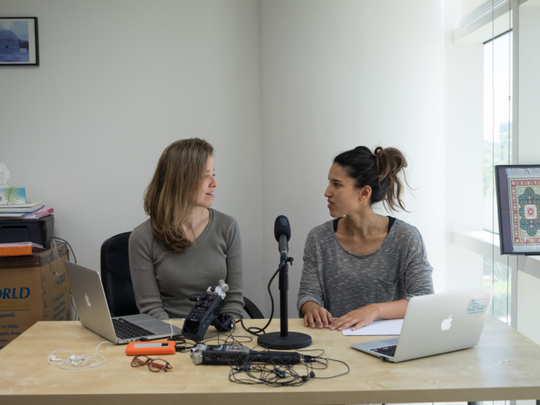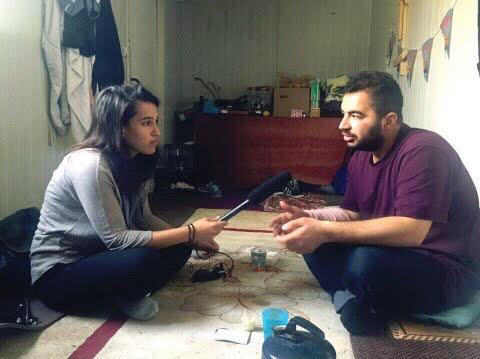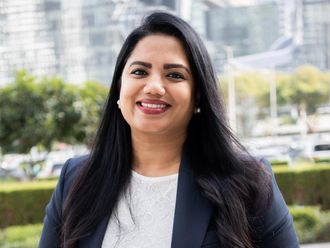
It’s no secret that most people’s ideas of the Middle East are formed by broad generalisations inspired by newspaper headlines, and misleading and often one-sided narratives coming out of international media. But UAE-based podcast Kerning Cultures is on a quest to shift those very ideas by telling “stories of culture, history, science, current affairs, and entrepreneurship from the Middle East and its diaspora”.
“We grew up in a Middle East that has often been politicised by media. Whereas, our lived experiences have always been more nuanced,” says co-founder, co-host and business director Hebah Fisher.
From stories about Al Ain’s public health system (episode Birthplace of the UAE) and an Afghani kitemaker who immigrated to the US (Fight or Flight) to the intimate setting of a spoken word poetry session in Dubai (Poetry, Deconstructed) and street art in Beirut (Reviving Hamra Street), each episode opens a new window of understanding into the complex narratives of the region, promoting empathy and an organic cultural exchange.
A particularly interesting and divisive episode saw the team speaking to US President Donald Trump’s American supporters who are of Middle Eastern descent, before the election. “Today we’re going to mess with your heads a little bit,” says one of the co-hosts at the beginning of Mid East for Trump. The episode speaks to a few Trump supporters, both Muslim and Non-Muslim, one of whom is Hussain Khorram, an Iranian Muslim American living in Seattle, who was raising funds for the Trump campaign. The episode is a good example of the team’s continuing efforts to tell balanced and nuanced stories, especially when it means having to put their own political beliefs aside.
Kerning Cultures was co-founded by Fisher (co-host and business director) and Razan Al Zayani (co-host and executive producer) two years ago. Both co-founders are based between Seattle and Dubai respectively. The rest of the team includes sound engineer Ramzi Bashour (USA), and producers Dana Ballout (Lebanon/USA), Ahmad Zeid (Ireland), Alex Atack (UK/Dubai), Alexandra Chaves (Dubai), Jackie Sofia (USA), Lilly Crown (USA/Jordan), Rabiyah Shabeeh (Dubai) and Percia Verlin (USA).
While they don’t disclose the number of listeners they have currently, Kerning Cultures has listeners from the US, Egypt, Lebanon, Saudi Arabia, the UK, and Portugal.
Excerpts from an email interview with Fisher and Alzayani follow:
Let’s go back to the beginning. Why was Kerning Cultures conceived?
Razan Al Zayani: Kerning Cultures was conceived out of a purpose to tell the narrative of the Middle East complete with all its subtleties. The Middle East is often painted with one broad brush stroke, but there are so many factors that shape people’s lives, belief systems, culture, collective histories and so on, and we ultimately wanted to bring this to the forefront in the form of captivating audio stories.
Had either of you produced podcasts before?
Hebah: Before Kerning Cultures, no. We have both been longtime storytellers — but audio was a new medium for us, and there certainly was a learning curve. Especially because podcasting is so new to the Middle East at large; we’re one of only a handful in the UAE.
What is the advantage of telling the stories you want to tell through the podcast format?
Fisher: Podcasting draws on a longtime tradition of oral history in our region: sitting around a majlis, fire, or dinner table and sharing stories. Now, that tradition is available in curated, on-demand form. We believe Kerning Cultures is at the forefront of a storytelling renaissance. Moreover, radio still reaches more households in the Middle East and North Africa than video — audio is still king, and bringing high quality production to it is really exciting for us.
Al Zayani: Audio is a very intimate medium. Long-form audio stories have continued to stick with us because we’ve been using our imagination to construct scenarios, stories and characters while listening. Podcasts are also on-demand and can be listened to at any time, making it a very great medium to produce high quality content in. We are also living in a country where people often spend a long time commuting, what better way to pass the time than to learn about something new?
How have people who are not from the Middle East reacted to the podcast?
Fisher: We continue to get goose bumps when non-Middle Eastern listeners tell us how transformative our stories are for them. We’ve heard comments like (in response to our episode about Yemeni coffee), ‘The only thing I associated with the Middle East was terrorism. As a coffee lover, I had no idea anyone in the region was working on something I care about. We need more stories like this’. Or, in response to our start-up series, ‘After listening to these stories, I just sold my motorcycle to fund a plane ticket and will now visit the Middle East for the first time.’
Al Zayani: Some have said, ‘Listening to this podcast is like experiencing those parties when all of your smartest, ‘worldliest’ friends are deep in discussion.’ We love dinner parties like this. If anything this was one of the best compliments we could possibly get.
How difficult (if at all) was it to get people in the Middle East region to listen to a podcast, given its nascent development here?
Fisher: Sometimes we start our conversations with the basics of ‘what is a podcast’, but the concept is quick to pick up from there. Once people realise they can download these episodes from the convenience of their phones and listen to stories during slow traffic jams on Shaikh Zayed Road, they get pretty excited.
Tell us about your production process. How do you pick the stories you want to tell and how do you go about turning them into an episode?
Fisher: Often listeners will pitch us stories, or we’ll be curious about something and start researching it. We aim to share stories that reshape the way we think about our world, so we’re always looking for stories with depth and complexity. We start by doing a lot of research and interviews, and then set about scripting and producing the episode. Lastly, our talented sound engineers bring the audio to life with originally composed tracks or recordings from the places featured in the story.
Al Zayani: We tell stories we are often curious about, that spark complex answers and even more complex questions from our team. We look for stories with strong characters that are able to articulate the intricacies of their lived experiences. Some story ideas have come from listener suggestions; some have arisen as a consequence of searching for other stories.
How long do you usually spend producing one episode?
Fisher: Our longest turnaround has taken us 6+ months of research, multiple in-person interviews, and production. Our shortest cycle took us a week and a half.
Finally, what advice do you have for people who are looking to begin their own podcast in the region?
Fisher: The fantastic thing about podcasting is it’s very easy to get into. You can begin recording from your smartphone or your laptop, and there are countless free audio editing softwares and hosting platforms when you’re ready to share your podcast with the world. It’s important to know what kind of style and purpose you’re aiming for with your show — there are thousands of podcasts across all sorts of topics and styles, so make sure you’re offering something with a unique spin to build you audience. As a sincere offer to Gulf News readers, if you want to get into the podcast space, reach out to us and we’ll offer whatever guidance we can. We’ve been building a great network of podcasts across the Middle East and North Africa and we can all learn from each other. Find us at info[at]kerningcultures.com.












